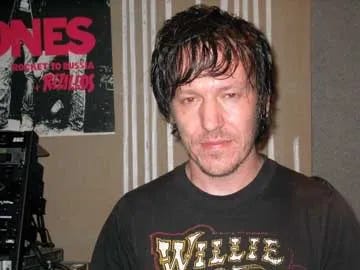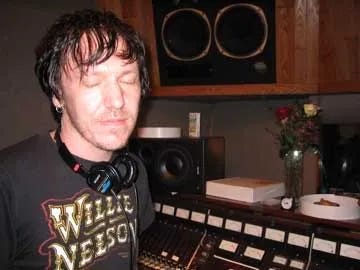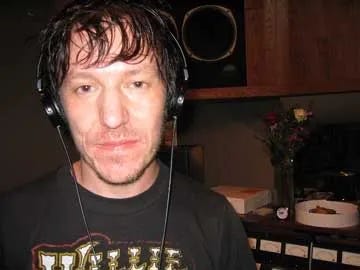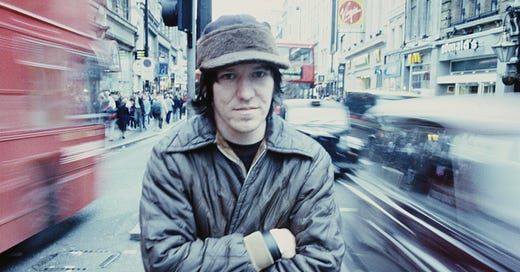Elliott Smith—I don’t even know what to say—a genius, a poet, a prodigal songwriter who built an inimitable indie discography out of Beatles melodies, vocal layering, and harrowing lyrics that transcribed the emotional state of a deeply troubled man who struggled with mental illness, drug addiction and intermittent psychosis near the end. The end being 2003, when he died of apparently self-inflicted stab wounds to the chest in his Los Angeles home; by then he had been on a downward spiral for some time, in a paranoiac state brought on by crack and heroin abuse.
The last album Smith recorded was From a Basement on a Hill, which was released after his death in 2004. For most of his solo career, Smith’s work could be fairly described as Folk/Rock, in the sense that he made folk songs, and he also made rock songs. But From a Basement on a Hill is an expansive and deeply weird album that emerges from a drug-addled and artistically daring era when Smith started to experiment with noise and harsher production textures, taking cues from Lou Reed and The White Album.
Those influences especially stand out on “King’s Crossing,” the last song that Smith recorded before his death. It starts with a full minute of Smith’s intercut mumblings, which sound like they are beamed in from a distant radio station.
Smith mutters (among other things): I’m the wolfman…thought white people following me…put me down…whatever you say. It’s meant to sound like snatches of conversation between lowlifes, and gives way to a portentous groaning that slowly builds to a coo, like a folkier “Great Gig In The Sky,” until a lo-fi piano track kicks in, replaced by electric guitar as Smith starts to sing.
The King's crossing was the main attraction
Dominoes falling in a chain reaction
The scraping subject ruled by fear told me
Whiskey works better than beerThe judge is on vinyl, decisions are final
And nobody gets a reprieve
And every wave is tidal
If you hang around you're going to get wet
After listening to this song about a thousand times, I believe that I have cracked its meaning. This is a story about relapsing, a stylized fable about addiction. It is set in King’s crossing, a junkie haunt in Portland, and Smith elevates the setting with potent imagery: “dominoes falling in a chain reaction” conjures a dark awareness of addicts collapsing, one after the next.
“The scraping subject ruled by fear” might be the best five words that Elliott Smith ever wrote, brilliantly summarizing (and exonerating) the tragedy of the homeless addict. He also injects a bit of hilarious realism with “whiskey works better than beer,” as the advice a homeless guy gives you. This song is morally grounded in a painful self-awareness; Smith knows that he is solely responsible for going to King’s crossing. He knows that if you hang around a place like that, the tidal wave (addiction, poison, the disease) will come for you.
I can't prepare for death any more than I already have
All you can do now is watch the shells
The game looks easy that's why it sellsFrustrated fireworks inside your head
Are going to stand and deliver talk instead
The method acting that pays my bills
Keeps the fat man feeding in Beverly HillsI got a heavy metal mouth, it hurls obscenity
And I get my check from the trash treasury
Because I took my own insides out
There is something very powerful about the talky way Smith delivers the first line of the first stanza here. It feels like an aside, a tangential (and deeply suicidal) thought too important to leave out of the song. Of course, the specter of suicide hangs over many of the best Elliott Smith songs; it was a constant fascination of his.
As the production builds to a staticky alt-rock lushness here (which literalizes “frustrated fireworks inside your head"), Smith issues a withering assessment of his life as an artist and addict. This is something that most autobiographical writers have to reckon with at some point in their career; the way that pain fuels the art, and the way that success ends up flowing back into pathological behaviors that generate further pain.
It’s especially interesting in the context of a song about relapse, and it emphasizes my feeling that “King’s Crossing” is a metatextual fable. The song, recorded by the real Elliott Smith (in Los Angeles), depicts the character Elliott Smith as he walks into King’s crossing (in Portland, where he grew up) and buys heroin.
It don't matter 'cause I have no sex life
And all I wanna do now is inject my ex-wife
I've seen the movie
And I know what happensIt's Christmas time
And the needles on the tree
A skinny Santa is bringing something to me
His voice is overwhelming
But his speech is slurred
And I only understand every other word
For years, I assumed that Smith was referring to a desire to inject his literal ex-wife with something. But it’s actually a clever riff on a Lou Reed lyric from the song “Heroin,” where Reed lovingly describes the drug as “my wife and my life.” Here, singing about relapse, Smith flips it into a desire to inject himself with his “ex-wife—” heroin.
It’s important to note that Elliott Smith himself was not a needle user. He was a drug addict, an avid smoker of crack cocaine and heroin at various times, but he never injected. This doesn’t make the song feel less true to me. Elliott Smith was also a writer. Needles are powerful imagery, and Smith uses them to hystericize these lyrics. It gets back to what I said about the song being a fable, a story that symbolizes his life.
If you’re not too busy, I would ask that you consider listening to the end of this song one more time, via this live acoustic set recorded at the Henry Fonda Theatre in 2003. The first song in the video is “King’s Crossing,” and you can skip to around 2:15.
Give me one good reason not to do it
(Because we love you)
So do itThis is the place where time reverses
And dead men talk to all the pretty nurses
Instruments shine on a silver tray
Don't let me get carried away
Don't let me get carried away
Don't let me be carried away
After Smith sings “Give me one good reason not to do it,” listen closely. Rewind if needed. You can hear his sister, Ashley Welch, and his girlfriend, Jennifer Chiba, just offstage, yelling in unison: “BECAUSE WE LOVE YOU!”
In the song’s final stanza, Smith describes the disorienting experience of waking up in an inpatient facility. He begs someone—friends, family, listeners, himself— to rescue him. The final plea is sung so delicately, the high note so hopeful, a desperate and nearly childish sweetness seeping through the bleakness of the words.



“King’s Crossing,” with its nightmarish rendering of an addict in relapse, was the last song that Elliott Smith recorded before his death. It’s so perfect and fucked up and horrifying to think about. You look at these pictures and find yourself asking inappropriate questions about decisions, and alternate timelines, and did he know.
22 years on from his last breath, I find myself mourning the death of Elliott Smith with vivid sensation. If anyone deserves to be called a beautiful soul, it was this songwriter-savant, in true communion with his inner child, attempting and failing to heal himself through song.
I am so grateful for the art he was able to give us. I am so deeply sorry that he was unable to accept the love and the light in his life. On “King’s Crossing,” he asked for one good reason not to do it, and when he got one—BECAUSE WE LOVE YOU—he was already too far gone to hear it.





Thanks for this ✌🏼
Brilliant! Thank you! Here is a little “tribute” cover song that I did if you have time to listen. -Billy
https://open.substack.com/pub/billy2r6q7/p/xo-elliott-smith?r=1nyjrs&utm_medium=ios